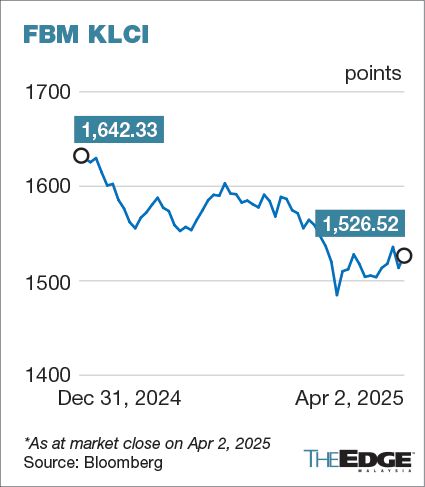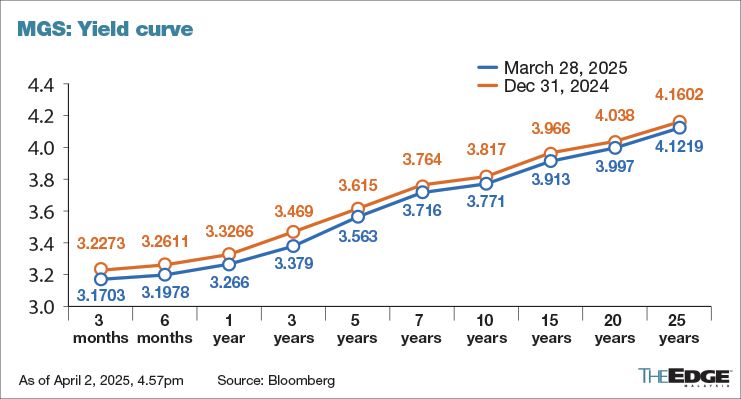
KUALA LUMPUR (April 2): As risk aversion rises, investors are increasingly seeking shelter in Malaysian bonds to weather the slump on Bursa Malaysia and other stock markets.
The yields on Malaysian government bonds have fallen as prices rose, with analysts and fund managers saying there is room for yields to decline more as investors continue to prefer safer assets amid global uncertainties.
"We have been in a long position on bonds since 2023, when the Fed indicated interest rate cuts,” said Areca Capital Sdn Bhd chief executive officer Danny Wong Teck Meng. “Since then, we have continued to hold onto bonds in Malaysia.”
The benchmark FTSE Bursa Malaysia KLCI equity gauge is down nearly 8% by the end of March amid persistent foreign outflow totalling more than US$2.2 billion (RM9.8 billion). All sectors, including those touted for being defensive, reported year-to-date decline.
However, the ringgit has barely changed since the start of 2025, suggesting minimal repatriation despite the massive foreign selling.
In contrast, the yield on Malaysian Government Securities (MGS) have fallen up to 10 basis points across the curve while the latest auctions also drew strong demand. Corporate bond issuance has also surged, indicating appetite for relatively safer assets at a time of uncertainties.
"Investor risk aversion is on the rise,” said United Overseas Bank (Malaysia) Bhd senior economist and executive director Julia Goh.
In the first quarter, the “ringgit bonds were functioning as they should: reducing risk and providing stability,” said Maybank Investment Bank. Supply-demand picture remains “supportive” as issuances of MGS are expected to decrease with the government’s fiscal consolidation, the research house said.
Further, US treasuries are now commanding a rare yield premium over MGS with the Federal Funds Rate being higher than Malaysia’s overnight policy rate.
The US Federal Reserve is expected to cut its policy rate later this year while Bank Negara Malaysia is widely anticipated to keep its policy rate unchanged through 2025, which could shrink the gap and boost the appeal of Malaysian bonds to investors.
“We have argued that the Malaysian market would remain one of the most resilient to global rate volatilities, anchored by benign growth-inflation dynamics, a deep investor base and the government’s commitment to fiscal consolidation,” said the Australia & New Zealand Banking Group.
- FBM KLCI down 4.17% to more than two-year low on global trade war woes
- Asian stock benchmarks drop most in 14 years on tariff concerns
- China has already trade-war-proofed its economy
- Trump team rejects market fears, shows defiance on tariffs
- Malaysia should not panic, rush into decisions over US tariffs, says Amir Hamzah
- US reciprocal tariffs to negatively impact CPO prices, may prompt earnings cut — CIMB Securities
- Britain eases electric vehicle sales targets for automakers
- Asian stock benchmarks drop most in 14 years on tariff concerns
- Yen, Swiss franc jump in volatile trade as global recession fears grow
- Anwar: Tackle issues effectively to avoid exploitation by irresponsible parties


